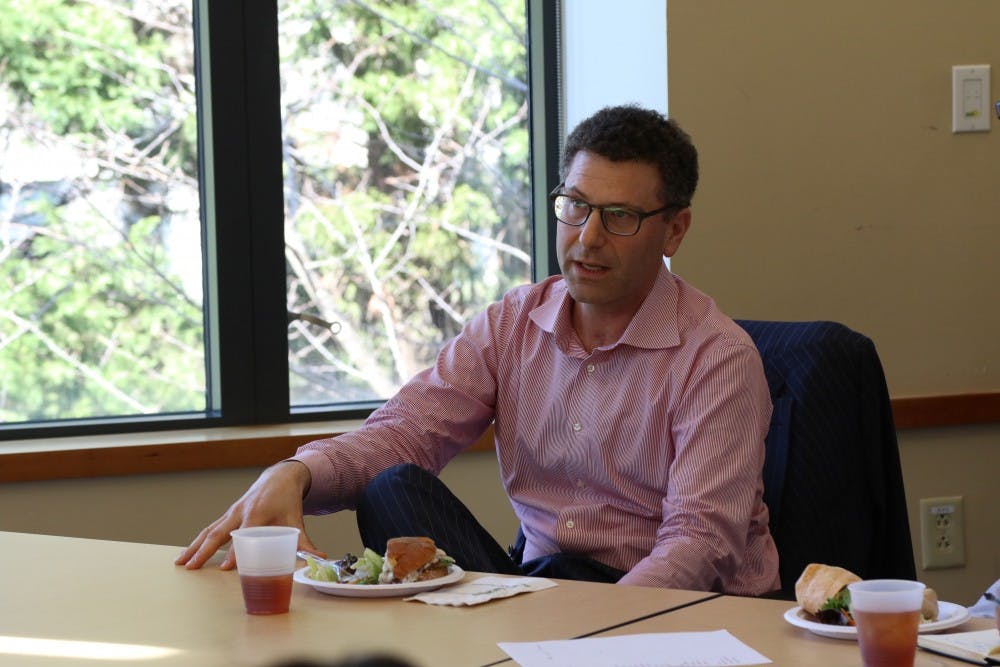Peter Wallsten, deputy editor of national politics and White House correspondent at the Washington Post, spoke Monday on investigative reporting in today's media landscape.
Wallsten, who joined the Post in 2010, fielded questions about fake news, journalistic ethics and fact-checking—especially in regard to President Donald Trump’s administration. The question-and-answer session was moderated by Bill Adair, Knight professor of the practice of journalism and public policy and director of the DeWitt Wallace Center for Media and Democracy.
“I think there is a growing sense in the industry that what we do has value, that investigative journalism and fact-based journalism has a lot of value,” Wallsten said, noting that digital subscription rates for the Post and for the New York Times have increased substantially since Trump was elected. “There’s a large group of consumers around the world who are looking for fact-based and [enterprising] journalism that digs deep and does reporting.”
Acknowledging the intense public scrutiny of news sources under the Trump administration, Wallsten emphasized the importance of publishing only verified news despite pressure to break a story first.
“I feel like we have to really work hard not to make mistakes and that when we do make mistakes, we have to correct them and be transparent about it,” Wallsten said. “When journalists make a mistake now, the costs are really high because there are lot of people who are waiting for us to make a mistake so they can criticize us as being fake and delegitimize us.”
Wallsten also touched on the need to preserve the legitimacy of the Post as a newspaper.
When sophomore Asa Royal asked Wallsten about his stance on the firing of transgender reporter Lewis Wallace, who wrote a controversial Medium post stating his inability to cover Trump’s administration as a transgender journalist, Wallsten noted that he thinks reporters should not serve as both reporters and spokespeople for a cause.
“Obviously every person has personal views, but the important thing for us to maintain credibility is to make sure that our work speaks for itself, and that you’re not having a dual role as a spokesperson for your views but also a reporter,” Wallsten said. “I feel strongly that everyone has a right to speak their mind and to be an activist and an advocate, but if you want to be an activist or an advocate, then don’t come work for the Washington Post as a news reporter.”
Wallsten also discussed investigative national politics at the Post, which began running short-term investigative stories in addition to traditional months-long investigative projects around 2014.
Among the projects that his team have undertaken are investigations of lapses in the internal administration of the Secret Service, Jeb Bush’s business ties, the mixing of roles within the Clinton foundation and Donald Trump’s candidacy.
Wallsten noted that the Post was one of the few news outlets to take Trump's campaign seriously, assigning a full-time reporter to cover his campaign from the beginning.
Responding to multiple queries about the possibility that leaks were coordinated by a bureaucratic agenda, potentially damaging the credibility of the investigative team’s sources, Wallsten declined to speculate about the motivations of leakers, explaining that the validity of the leaked information should take a higher priority.
“The most important thing that weighs into our decision making is whether the information is true and verifiable and whether it has value to the public,” Wallsten said. “The issue is not simply the motives of a leaker or a source, but it’s a decision we have to make about whether something is worth reporting, is there a public service in getting the information out there.”
Addressing questions about how the Post ensures the credibility of anonymous sources, Wallsten noted that the Post typically confirms the accuracy of statements by consulting multiple sources, each of whom must present firsthand information.
“We don’t put unverified stuff in our stories, and we feel pretty strongly about that,” Wallsten said. “We routinely do not publish unverified opposition research that sort of comes to us to inform our reporting.”
Wallsten also stressed the importance of avoiding sensationalist tactics.
“We don’t do clickbait, but we do try to come up with snappy headlines that fairly portray the story but will generate attention,” he said.
Get The Chronicle straight to your inbox
Sign up for our weekly newsletter. Cancel at any time.

